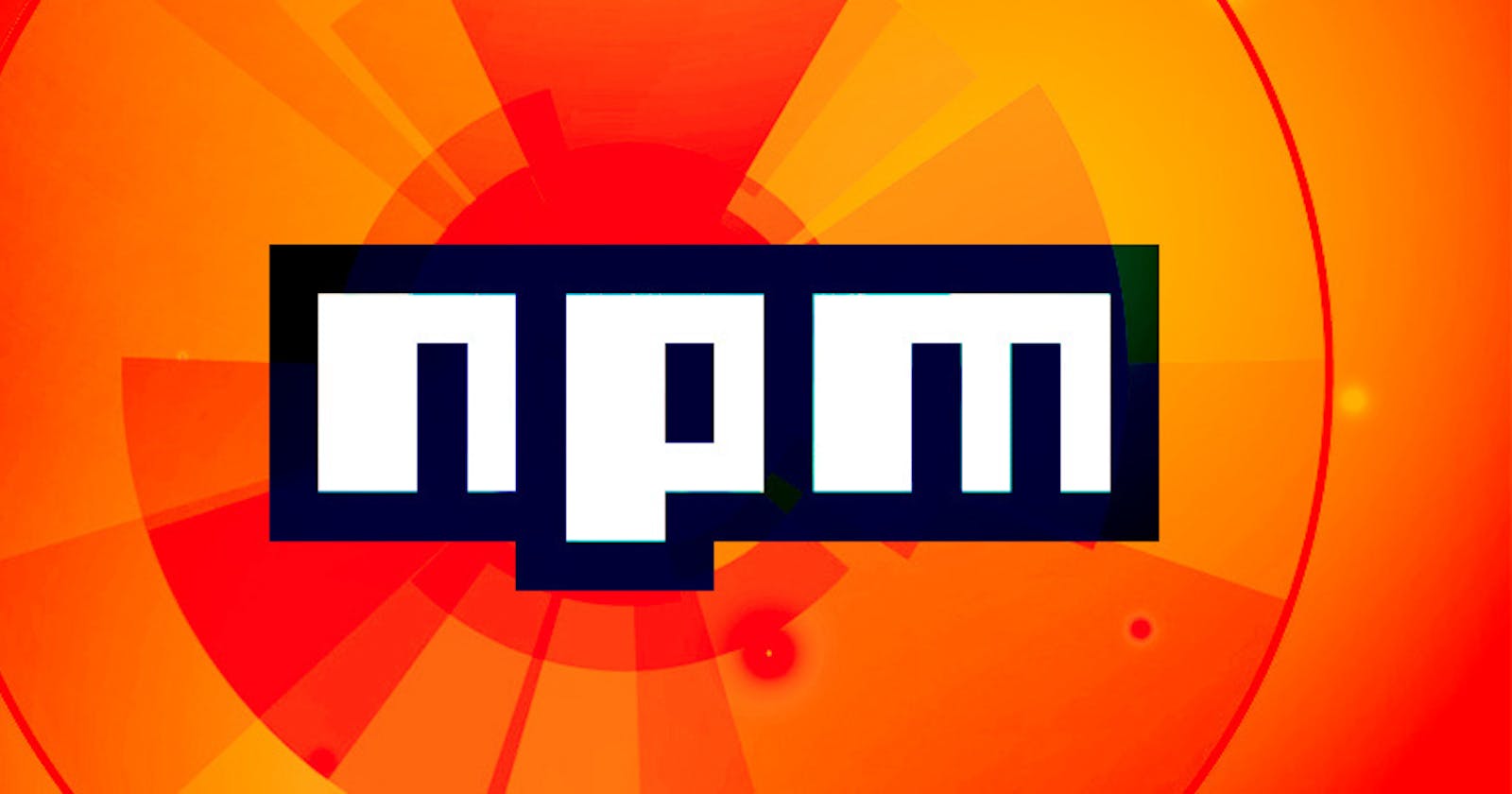Table of contents
- Understanding of NPM
- Let's use NPM
- What does "use NPM" mean?
- Create Project
- What is package.json?
- package.json's components
- Dependency Management
- What is library?
- Let's install packages from online storage!
- Add & Download dependency
- Dependencies and devDependencies
- package-lock.json
- Version Notation
- Download all Dependency
- Download production dependency
- Add global packages.
- Local package and Global package
- What should we use between local and global package?
- Remove dependency
- Execute Script
- Why do we use npm script?
- Common Scripts
- NPM Summary
- NPX
- Node.js Module
- Writing and Use of Module
Understanding of NPM
What is NPM?
- Node Package Manager.
- NPM is a necessary tool to manage Node.js project.
- Online Storage + Command Line tool
What is NPM Online Storage?
- It is a place for numerous open source libraries and tools to be uploaded.
- We can easily search libraries and tools we need.
- It has a big ecosystem
What is Command Line Tool?
- We can Install tools and libraries from online storage using command line tool.
- We can also set up and manage our project.
- We can manage dependencies for our project.
Let's use NPM
What does "use NPM" mean?
- It means we learn how to use command line tool.
Create Project
npm init
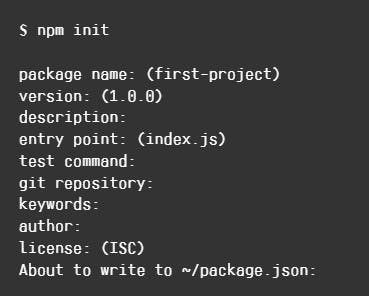
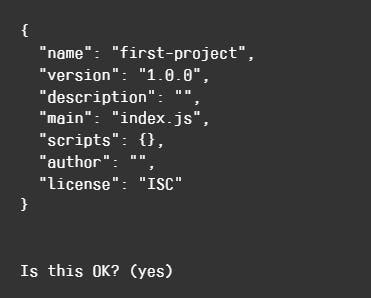
- This command creates a project directory
- In the directory, It makes package.json file after some of questions.
- This project directory is Node.js project.
What is package.json?
- It is a file that information associated with project is saved.
- We can remote this file directly or by npm command line.
package.json's components
- version : project version.
- name : project name.
- description : project description.
- scripts : It is a custom script we can run by "npm run [script name]" command.
- dependencies
- devDependencies : Dependencies only used in development environment.
Dependency Management
- It is a way to manage dependencies used in our project.
- Because we are relying on many libraries, We say these libraries are "dependency".
What is library?
- This chunk of code operates specific functions.
- We use complicated functions we need from other people's code of online storage.
- library is called "package" in Node.js
Let's install packages from online storage!
Add & Download dependency
npm install [package-name]
- We can add packages we need.
- Added packages are added in dependencies of package.json file.
- library code is saved in node_modules.
Dependencies and devDependencies
npm install [package-name] --save-dev
- We can separate dependencies for development environment from production environment.
- dependencies for development environment are added in devDependencies of package.json file.
package-lock.json
- This file fixes the version of packages in dependencies.
Version Notation
npm install [package-name]@[version]
- ~1.13.0 -> installl version 1.13.x
- ^1.13.0 -> install version 1.x.x
- 0.13.0 -> install 0.13.0
Download all Dependency
npm install
- This command download packages defined in package.json.
Download production dependency
npm install --production
Add global packages.
npm install [package-name] --global
Local package and Global package
- Local package : packages declared in package.json file and saved in node_modules
- Global package : packages installed by "npm install -g" command and saved in global package stoage in our computer.
What should we use between local and global package?
- For the good management of our project, We should use local package.
Remove dependency
npm remove [package-name]
- We can remove dependency package.
- This removes packages from dependencies and devDependencies of package.json file and node_modules folder.
Execute Script
package.json
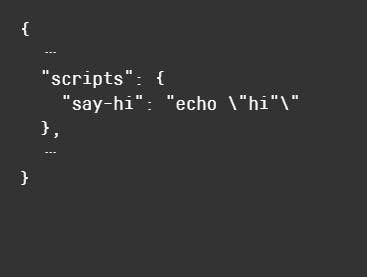
run

Script is code that operates simple behaviors.
- It is declared in package.json
- We can run the script in package.json using "npm run [script-name]"
Why do we use npm script?
// 1
"scripts" : {"test" : "node_modules/.bin/tap test/\*.js"}
//2
"scripts" : {"test" : "tap test/\*.js"}
- We don't have to write where node_modules folder is. We can just access to packages easily like number 2
Common Scripts
- test : unit test
- start : project start
- stop : project stop
NPM Summary
- npm init : Create project
- npm install : Add dependencies
- npm remove : remove dependencies
- npm run : run script
- node_modules directory : Directory that chunks of packages are saved.
- package.json file : project management (Version, dependencies..)
- package-lock.json : Check dependency version.
NPX
What is NPX?
npm i cowsay -g
cowsay hi
npx cowsay hi
// We can choose specific node.js version
npx node@12 index.js
npx node@14 index.js
- This is a tool we can use npm package without installing it.
- We can execute npm package right way not adding the packages to our project and global package storage.
Execute code in github gist
npx https://gist.github.com/zkat/4bc19503fe9e9309e2bfaa2c58074d32
Node.js Module
What is Module?
- Module is a solution to split code into separate functions.
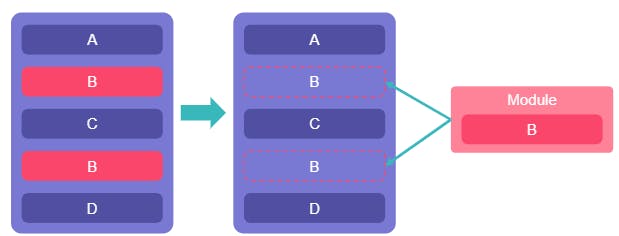
- We separate B code as a module because It is reused in all codes.
Module and Packages
- A chunk of modules is a package
- So npm packages are having a chunk of many modules.
- package > module
Default Provided module in Node.js
console
// Express log level
console.log();
console.warn();
console.error();
// time trace
console.time();
console.timelog();
console.timeEnd();
Process
- This provides arch, argv, env associated with execution environment.
- This also provides abort, kill, exit associated with process behavior.
fs
- We use this for file input and output.
- readFile : read file, writeFile : write file
- Provide Sync function for synchronous operation.
- Detect file/directory changes using watch.
http
- We use this for http server and client.
- Create server using createServer function.
- Create http request using Request function.
Writing and Use of Module
How to declare module in code?
const name = ‘elice’;
const age = 5;
const nationality = ‘korea’;
module.exports= {
name,
age,
nationality ,
};
---
const student = require(‘./elice’);
// print student -> { name: ‘elice’, age: 5, nationality: ‘korea’}
Basic writing of module
module.exports= {
name,
age,
nationality ,
};
Writing module by variable name
constname = ‘elice’;
constage = 5;
constnationality = ‘korea’;
exports.name = name;
exports.age = age;
exports.nationality = nationality;
How to export a function?
module.exports= (name, age, nationality) =>{
return { name, age, nationality,};
}
---
const student = require(‘./elice’)(‘elice’, 5, ‘korea’) ;
// print student -> { name: ‘elice’, age: 5, nationality: ‘korea’}
- We can make a module a function.
- So we can give arguments to modules when we declare the module.
How to use module?
require("module path");
const dayjs = require("dayjs"); // npm package
console.log(dayjs());
const myModule = require("./my-module"); // my-module/index.js
console.log(myModule);
const myFunctionModule = require("./my-function-module"); // call functional module
console.log(myFunctionModule(name, age, nationality));
How to call Json file?
const myDataa = require("./my-data");
console.log(myData);
- Json files are parsed into object automatically.
